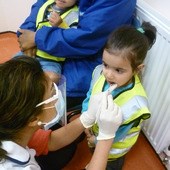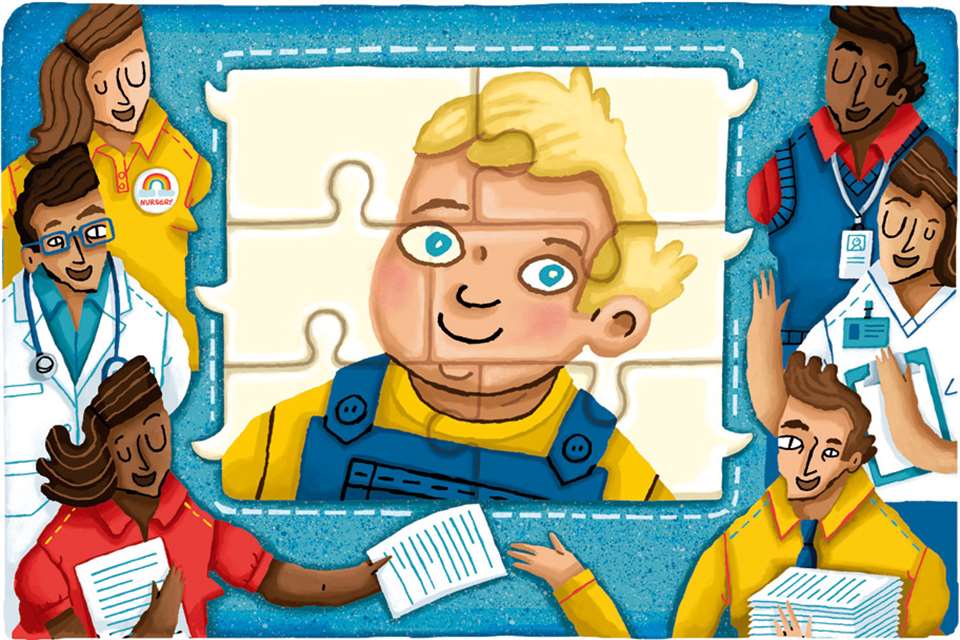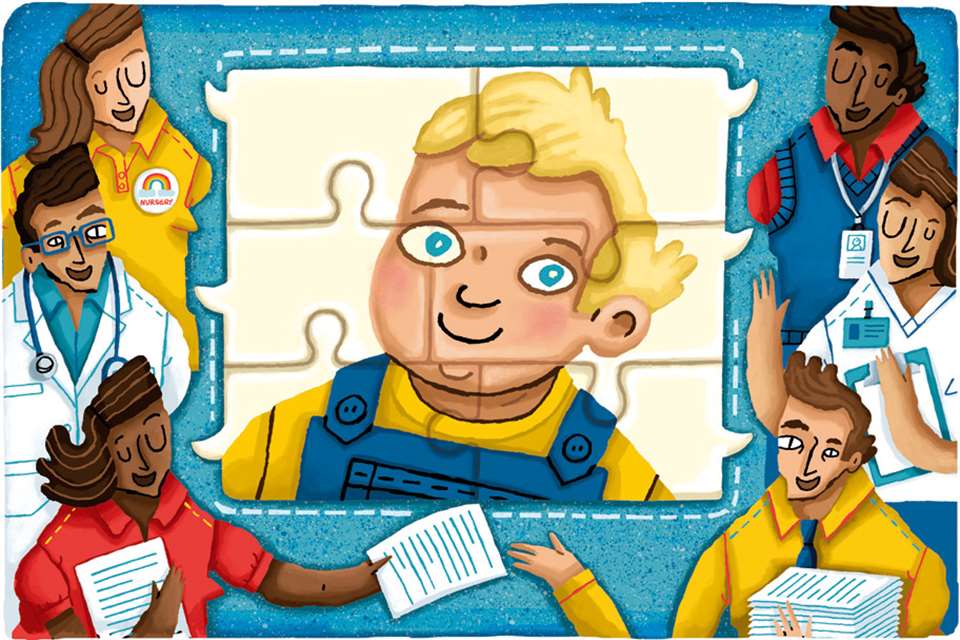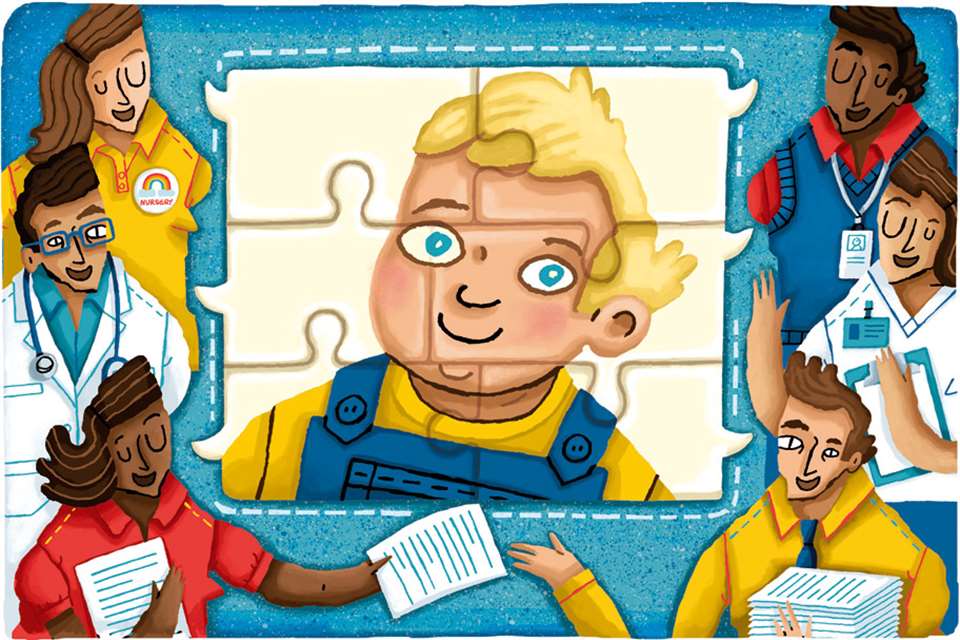Multi-Agency Working: Part 4 - Multiple Benefits
Monday, April 18, 2016
Having looked at the overarching challenges of multi-agency working, Hannah Crown looks at where settings are getting it right

If you are looking for the crème de la crème of multi-agency working, you could do worse than look at Pen Green. Founded in 1983, the idea was for a one-stop shop for families, staffed by a multidisciplinary team. The centre now includes a research arm, children’s centre, birth to threes education with care and a nursery school (with teaching school status). Margy Whalley, director, says, ‘Every adult and child has been entered into the system since 1983; we have one data set and all the agencies use it collaboratively. This includes health visitors, social workers, midwives and speech and language therapists. They are not secret files, and a parent should be able to read them. We have trained staff to write in a way such as there should be no surprises for a parent.’
Donna Gallagher, children’s centre deputy head, adds that parents are asked to sign a consent form on arrival at the centre for internal information-sharing, but externally this can pose problems. She says, ‘If the child is known to social care or on a child protection plan, parents know we will have to share information – the law is very clear on that. The challenge comes when we are working in the early help area. If you want to raise an issue with another colleague, e.g. in mental health, you have to ask for consent. Sometimes parents say no, and then that is a whole piece of the jigsaw you have not got.’
When tackling this, she says, persuasion is key. ‘You could say, “We aren’t sure we are going to be able to give you the right support.” It might take two to three meetings [with the parent]. Once they see you are being genuine and honest, that is usually what moves it.’
Mental health
Ms Gallagher, a qualified social worker, is now co-leading a monthly midwives’ and health visitors’ forum, attended by the primary mental health nurse and lead midwife for Corby, where support is planned for vulnerable pregnant women. The consent that has been given by women to health visitors and midwives ensures that the forum is able to share information to facilitate the identification of those women most in need of additional services, says Ms Gallagher. This only applies to women who are already in the system, which includes the four children’s centres in Corby that work in collaboration.
An information-sharing agreement has enabled mental health services to become part of the forum and ‘and enhanced the coordination of services for the most vulnerable women and their families’, she adds.
As a result, she says, ‘Women have been able to access services more quickly. In a couple of instances where a case might have been closed we have said, “Can you keep it open until she has had the baby?” Women don’t always recognise if they are in psychosis and refer themselves, for example.’
The trouble for many settings is that they are without access to this level of professional input, perhaps because they don’t have a fully staffed children’s centre within easy reach. Children’s centres are being cut around the country, and even Pen Green is not immune. Northamptonshire County Council recently launched a consultation on full or part-closure of 17 of its 50 children’s centres, under which Pen Green’s children’s centre services would be offered on an outreach basis. The plans have been criticised by many, including Dr Whalley, who has said, ‘The centre is right in the heart of a very challenged community and a locality model in that community is vital.’
However, Ms Gallagher is keen to point out that cultivating links with different agencies can still be worth it for more isolated settings – not least because it ‘cuts down on duplication and on work’. As an example, she says that agencies are hoping to introduce a standard form. ‘If the midwife’s form asks to share information with the health visitor, we’re saying, “Can we be added as well? Can we have just one form?”’
Supervision
According to Dr Whalley, an often overlooked component of good multi-agency working is the ability to test out concerns informally – because staff are unlikely to want to go into a formal process on a hunch. ‘People need to get good supervision in their jobs. Most professionals don’t have it. They need the protection of airing anxiety in a non-formal way.
‘It should be with senior members of the team, from the moment they get the feeling that things are not right – because they are often correct and need to be able to articulate their concerns with confidence.’
CASE STUDY: TRAINING DEPOT DAY NURSERY
At Training Depot Day Nursery, where 53 out of 112 of the setting’s intake speak English as an additional language, there has been a move to take more funded two-year-olds. Staff co-ordinator Sandhya Godhania says, ‘Because we are in such a deprived area and children have quite high needs, there is no way we could cope on our own. We need the other agencies.’ The setting developed a close relationship with the local children’s centre, within a ten-minute drive, whose services include home safety checks and English and parenting classes.
‘A lot of our parents don’t speak English and some of the parents are quite young so they need parenting classes. Children’s centre staff have come in and done sessions just for them,’ Ms Godhania adds.
‘If parents are having problems with behaviour or toilet training, for example, we say, “Can we refer you to the children’s centre?”, and get them to sign a consent form. Parents do not always respond straightaway. It can take two or three conversations.’ On an information-sharing level, email is not used over data security fears, but referrals are telephoned through and then posted. If children’s centre staff do a home visit, ‘they will ring us back to let us know how it went’, Ms Godhania adds.
‘Health visitors also refer children to us. They want children in a nursery if they have a safeguarding concern. If the health visitor has a safeguarding meeting with a parent and there is no childcare while that takes place, they can send children here during the meeting free of charge.’
 High rates of tooth decay in Luton (39 per cent of five-year-olds, says Luton Borough Council) have paved the way for an annual excursion to the dentist. Ms Godhania says, ‘We get consent from parents of children most in need, and they can come to the appointment if they want. Most parents don’t realise they have to take children so early. Then once they are in the system the dentist sends them reminders and they are more likely to keep going.’
High rates of tooth decay in Luton (39 per cent of five-year-olds, says Luton Borough Council) have paved the way for an annual excursion to the dentist. Ms Godhania says, ‘We get consent from parents of children most in need, and they can come to the appointment if they want. Most parents don’t realise they have to take children so early. Then once they are in the system the dentist sends them reminders and they are more likely to keep going.’
The setting also has taken steps to address a lack of speech and language therapist (SLT) time. ‘There was such a waiting list for the council sessions. Parents had to fill in a form, get a referral, be put on a waiting list and get a letter. Most would then miss the appointment and then get taken off the waiting list.
‘With a drop-in session we can say, “You can go this Tuesday and we could accompany you.”’
The original hour-long assessment is shorter under the new system, but it means that more children are likely to get the help they need, Ms Godhania adds. The SLT is now planning on doing a one-off drop-in at the nursery.
This all has an impact on the team. Of the staff, 16 out of 21 are qualified to Level 3 or above, with two Level 4s and four graduates. Ms Godhania says the setting deliberately staffs higher than the minimum ratios, and that only those qualified to Level 3 with a first aid certificate are allowed to conduct these trips.
Issues can arise where agencies are not easily contactable. There is no social worker based at the children’s centre, for example. ‘We have also complained to social services because we thought a case was open when it had been closed and we weren’t told,’ Ms Godhania says.
On the whole though, she says, ‘if you use multi-agency working properly, it can really benefit families and children’.







